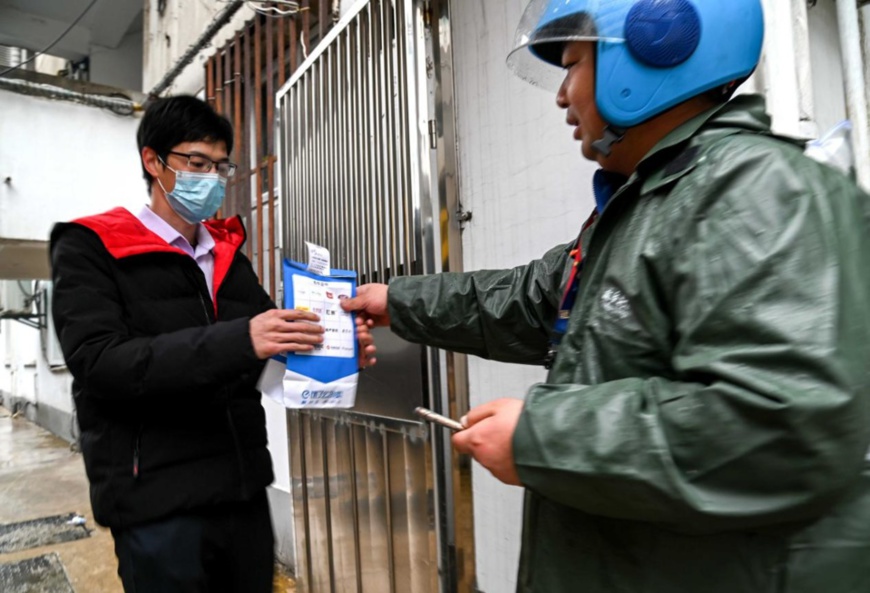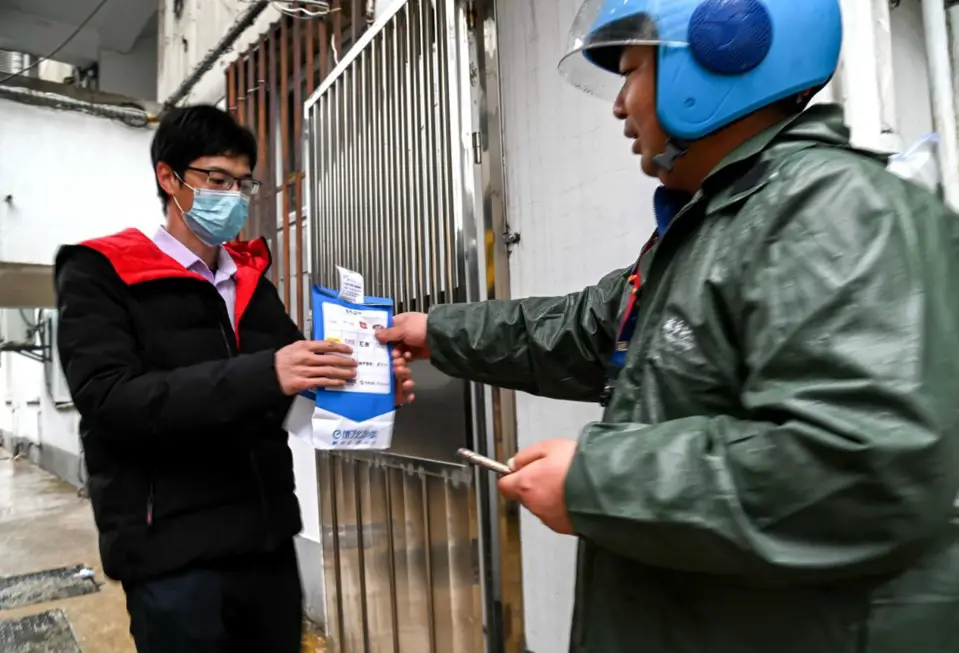By Peng Xunwen, People’s Daily Overseas Edition

Photo taken on March 18 shows a delivery man handing medicine to a local resident in Jinhua, east China’s Zhejiang province at a door of the residential building where he lives. This year, Jinhua city has taken the lead in rolling out a service in its urban areas that allows enrollees of China’s basic medical insurance scheme to place orders for drugs from six pharmacies via online platforms like Alipay and make payments online with their medical insurance accounts. (Photo by Hu Xiaofei/People’s Daily Online)
China determines to strengthen standardized management of platform economy, as online platforms are increasingly closely related to various aspects of people’s lives, and becoming an integral part of modern life with the rapid development of digital economy.
“Digitalization has really made our life convenient,” said a man surnamed Wang, who works in a company in Guangzhou, capital of south China’s Guangdong province. Benefiting from digital technologies every day, Wang can’t help expressing his excitement about the positive changes in life brought about by digitalization.
Every morning, Wang places an order on car-hailing apps for a ride to work. During the commute, he orders breakfast via a food ordering app. After he gets off work, Wang often buys vegetables, fish, and meat on a fresh food delivery app on his way home. And these foods are always delivered to his door by delivery people after he arrives at home.
Today, more and more Chinese people like Wang have been used to such convenience brought by the platforms empowered by digital technologies. Chinese e-commerce giants like JD.com and Meituan Dianping, mobile car-hailing platform Didi Chuxing, popular multi-functional social media platform WeChat, and express delivery services giant SF Express are all important participants in platform economy.
Last year, China’s internet companies and related service providers above designated size saw a total operating income of 1,283.8 billion yuan ($195.91 billion), up 12.5 percent year on year, according to data released by the country’s Ministry of Industry and Information Technology (MIIT).
The annual revenues of service providers on internet platforms totaled 428.9 billion yuan in 2020, a year-on-year growth rate of 14.8 percent, suggested data from the MIIT.
However, while bringing convenience to people’s life, the defective personal information protection mechanisms of internet platforms sometimes have brought troubles to consumers as well.
According to a report on the governance of internet platforms published by the China Academy of Information and Communications Technology (CAICT), problems that have yet been properly addressed in traditional economic activities, such as tort, counterfeit products, illegal information, and poor after-sale services, have become even more prominent in the era of the platform economy.
In addition, the emergence of some new business models and forms has caused new problems, including excessive collection of users’ personal information by some apps, contradiction and conflict between the flow and protection of data, absence of social responsibilities of platforms, as well as unreasonable practices such as forcing merchants to make a choice between different platforms, and profiteering by setting different prices for the same products or services for different consumers based on big data analysis of consumers’ shopping behaviors, as revealed by the report.
Only by strengthening standardized management while promoting development can the platform economy achieve sound and steady development, said Zhang Yansheng, chief researcher of the China Center for International Economic Exchanges (CCIEE).
Recently, China’s State Administration for Market Regulation issued a document that aims to introduce multiple measures for supervision and administration of online transactions to further clarify the responsibilities of platform operators. These measures involve requiring platform operators to verify and record information submitted by operators on their platforms and distinguish operators who have registered from those who haven’t with obvious marks; to establish an inspection and monitoring system for business activities of operators on their platforms; and to adopt measures including issuing warning and suspending or terminating services to ensure standardized operations on their platforms.
With the attributes of both market and enterprise, platforms are a crucial link in the standardized and sound development of platform economy, said Xue Jun, director of the E-Commerce Law Research Center of Peking University.
As an important regulation for implementing the e-commerce law, the document involving measures for supervision and administration of online transactions has practically enhanced the force of the e-commerce law, Xue noted.
“Digitalization has really made our life convenient,” said a man surnamed Wang, who works in a company in Guangzhou, capital of south China’s Guangdong province. Benefiting from digital technologies every day, Wang can’t help expressing his excitement about the positive changes in life brought about by digitalization.
Every morning, Wang places an order on car-hailing apps for a ride to work. During the commute, he orders breakfast via a food ordering app. After he gets off work, Wang often buys vegetables, fish, and meat on a fresh food delivery app on his way home. And these foods are always delivered to his door by delivery people after he arrives at home.
Today, more and more Chinese people like Wang have been used to such convenience brought by the platforms empowered by digital technologies. Chinese e-commerce giants like JD.com and Meituan Dianping, mobile car-hailing platform Didi Chuxing, popular multi-functional social media platform WeChat, and express delivery services giant SF Express are all important participants in platform economy.
Last year, China’s internet companies and related service providers above designated size saw a total operating income of 1,283.8 billion yuan ($195.91 billion), up 12.5 percent year on year, according to data released by the country’s Ministry of Industry and Information Technology (MIIT).
The annual revenues of service providers on internet platforms totaled 428.9 billion yuan in 2020, a year-on-year growth rate of 14.8 percent, suggested data from the MIIT.
However, while bringing convenience to people’s life, the defective personal information protection mechanisms of internet platforms sometimes have brought troubles to consumers as well.
According to a report on the governance of internet platforms published by the China Academy of Information and Communications Technology (CAICT), problems that have yet been properly addressed in traditional economic activities, such as tort, counterfeit products, illegal information, and poor after-sale services, have become even more prominent in the era of the platform economy.
In addition, the emergence of some new business models and forms has caused new problems, including excessive collection of users’ personal information by some apps, contradiction and conflict between the flow and protection of data, absence of social responsibilities of platforms, as well as unreasonable practices such as forcing merchants to make a choice between different platforms, and profiteering by setting different prices for the same products or services for different consumers based on big data analysis of consumers’ shopping behaviors, as revealed by the report.
Only by strengthening standardized management while promoting development can the platform economy achieve sound and steady development, said Zhang Yansheng, chief researcher of the China Center for International Economic Exchanges (CCIEE).
Recently, China’s State Administration for Market Regulation issued a document that aims to introduce multiple measures for supervision and administration of online transactions to further clarify the responsibilities of platform operators. These measures involve requiring platform operators to verify and record information submitted by operators on their platforms and distinguish operators who have registered from those who haven’t with obvious marks; to establish an inspection and monitoring system for business activities of operators on their platforms; and to adopt measures including issuing warning and suspending or terminating services to ensure standardized operations on their platforms.
With the attributes of both market and enterprise, platforms are a crucial link in the standardized and sound development of platform economy, said Xue Jun, director of the E-Commerce Law Research Center of Peking University.
As an important regulation for implementing the e-commerce law, the document involving measures for supervision and administration of online transactions has practically enhanced the force of the e-commerce law, Xue noted.
 Menu
Menu
 China to strengthen standardized management of platform economy
China to strengthen standardized management of platform economy
















